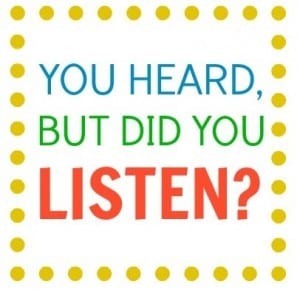

The researchers found that the speakers only received attention from those participants who were told to pay attention to them, based on their brain activity patterns. Selective hearing, in a way, is a gift and a defensive mechanism that protects our brains from excessive sound input.Īccording to another research, the presentation of noises inside your head does not represent all of the sounds in your environment, but rather what you want or need to hear. Your brain processes only a portion of the auditory data, even as your auditory system “listens” to the noise in your surroundings. Your brain determines what you listen to based on what you’re attempting to accomplish.Ī 2008 research showed that though the test played different pitches in each ear of the participants and were asked to note any changes in pitch in the focused ear, the participants ignored the sound in the other ear despite MRI scans showing that the participants’ brains did hear the sounds. This usually occurs when someone is not interested in what is being said or when they only want to hear certain things. Selective hearing is the act of only paying attention to certain sounds or voices while filtering out others. Selective hearing (also known as selective auditory attention) is the ability to focus on a single speaker while in a crowded or noisy setting. It can be detrimental to communication and cause a lot of conflict. Or, maybe they were only selectively listening to what was being said.Īs frustrating as it seems, selective hearing is quite common, especially among couples and families. Have you ever heard of the saying “I’m sorry, I wasn’t listening”? Well, that’s probably because the person wasn’t really listening in the first place. ReSound Rechargeable Custom Hearing Aidsĭo you know of someone who you feel doesn’t hear you whenever you are talking, or they seem to be preoccupied when you are trying to get their attention?.Receiver-In-Canal Hearing Aids (RIC/RIE).In the meantime, apply the suggestions above and get your toddler to learn to pay attention better. However, if you do feel that your child could have a problem with her hearing, do consult a doctor.

You’ll soon notice that she’ll stop what she’s doing and appear more attentive to your whispering.Ĭhoosing what to listen to is not due to any selective hearing disorder. Use whispers as often as you can, or whenever you feel your kid isn’t paying attention. Proper communication can also happen through whispering.A listening exercise for toddlers that you can try is to take her to a park and prompt her to listen to the birds chirping, a dog barking, or the wind whistling through the trees. By 25 months, your toddler should be listening to and identifying different sounds like tweeting birds and flowing water.The next time you want your child to be at the dining table, why not organise a race to it? She’ll be more inclined to get there! Kids quickly learn anything that is fun.Using subtle touches to earn her attention and establishing eye contact when needed are a few things you can do to get her to pay attention. The hands and eyes are pivotal in establishing effective and meaningful interactions.If need be, include physical gestures when communicating something to her. Complex directions will only confuse her and cause her to tune out what you say. At this age, your toddler can’t follow anything more than concise, crisp instructions.Kids can’t grasp an overload of information at once. Do you, at times, get too informative when communicating with your 25-month-old? Check this for getting your toddler to listen.


 0 kommentar(er)
0 kommentar(er)
